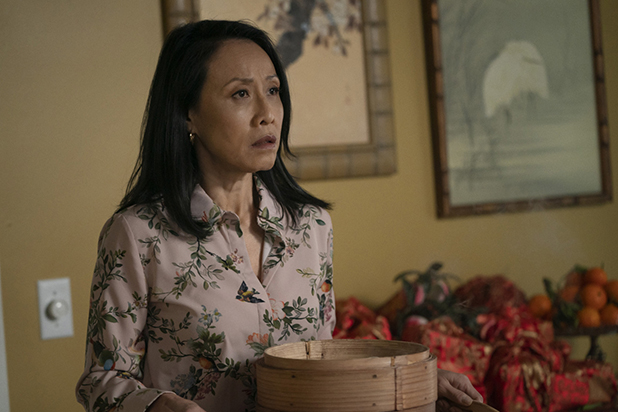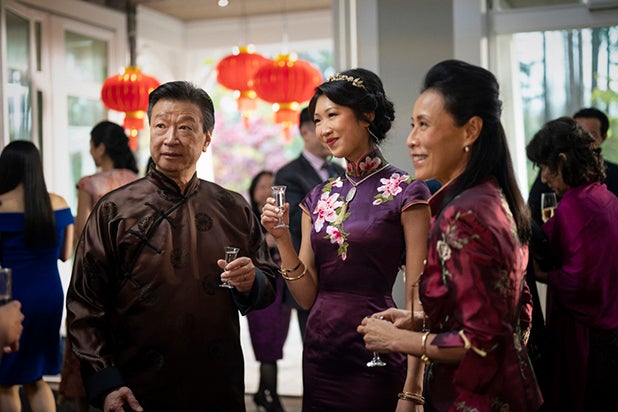Kheng Hua Tan Is Dispelling Tiger Mom Stereotype, From 'Crazy Rich Asians' to 'Kung Fu'
The veteran actress also gushes on starring opposite “Asian American Dad” Tzi Ma in the CW reimagining
Photo: The CW
Kheng Hua Tan is thrilled to be playing nuanced roles and breaking stereotypes.
The veteran actress is best known for portraying Kerry Chu in “Crazy Rich Asians,” the mother of Rachel Chu (Constance Wu). In the film, it’s revealed Rachel was conceived from an extramarital affair (the scandal is used to drive a wedge between her and her beau Nick), and that Kerry fled China to America to give birth to Rachel. Kerry comes clean to Rachel in an emotional heart-to-heart and helps her daughter find happiness. It’s a far cry from the demanding and unfeeling tiger mom stereotype that’s only concerned with academic success.
In the reimagined “Kung Fu,” which debuts on TheCW, Tan once again plays a mom, this time to series lead Nicky (Olivia Liang).
When you first meet her character Mei-Li, she does possess some of those tiger mom qualities.
“I think that in the pilot, you’re going to see a very, very tiger mom-ish type of mother, which may be very relatable to everybody,” Tan told TheWrap ahead of the premiere. “A mother who thinks she knows best for all her children. She does know what is best … for some of them, but not for all of them. And I think that the biggest gap that she has with regards to what she thinks is good for them and what is actually good for them is with Nikki. Throughout the series, and we are nearing the end of filming season one, you will see Nikki and her mother go through pretty amazing hurdles. For two people who start out so far apart from each other, they very quickly realize how similar they are to each other. And, and in my own experience. I’m very similar to my mum too, which is the reason why we’re so close and also the reason why there’s sometimes deep friction, because you can’t fight fire with fire. You certainly get that between Nicky and her mom.”
Kailey Schwerman/The CW
Another important relationship in “Kung Fu” is the one between Mei-Li and her husband Jin, played by prolific actor Tzi Ma. Tan joked that he is the “Asian American Dad” (having played father figures in “Mulan,” “The Farewell,” “Always Be My Maybe” and “Tigertail”) and sharing the screen opposite him is an honor.
“All I have to do is just look at him. Just look at him. And then all my emotions are there because all his emotions are,” Tan explains. “He is one of those actors — I totally understand why holds the title of “Asian American Dad” and a person that is so deeply respected by everybody — because every single take, the man gives 150% he is there whether or not the camera is on him or not on him. ‘Kung Fu’ may be written for a young adult audience, which The CW reaches out so effectively to, but they really give the parents a lot to work with beautiful things.”
Tan also has high praise for her on-screen daughter, played by Liang.
“Olivia is a special girl,” Tan gushes. “She is one of the most grounded, humblest, most hardworking, good-natured, funny number ones. She comes on set having worked five days more than everybody else. She is on set earlier and she leaves the latest. When everybody else is having an off day, she has to go right back to do ADR (dubbing), body conditioning and learn choreography. And she films scenes where she not only fights but she also loves; she has emotional scenes with me where she is breaking down every single second. She has the gamut. And yet, she makes me laugh. She buys me food!”
Presenting strong yet complicated family dynamics is important for representation, especially as anti-Asian violence surges across the country, especially elders.
“People are people no matter what color you are, where you come from, how old you are, what your preferences are,” Tan says. “Life is worth protecting. And why can’t we all just learn to do this one simple thing, which is to treat each other the way that we want to be treated ourselves?”
“Kung Fu” premieres Wednesday at 8/7c on The CW.
Source: Read Full Article

